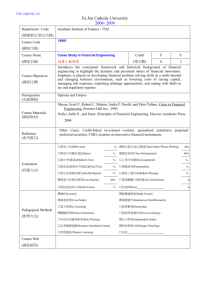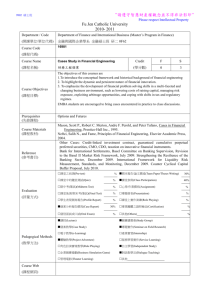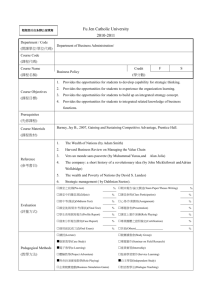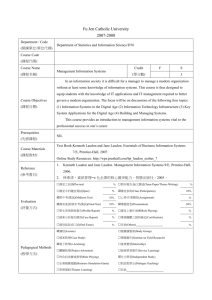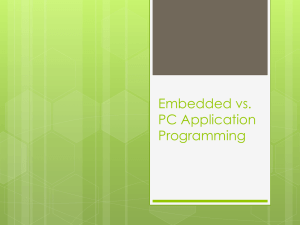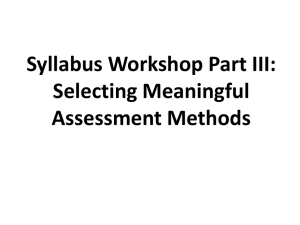Fu Jen Catholic University
advertisement
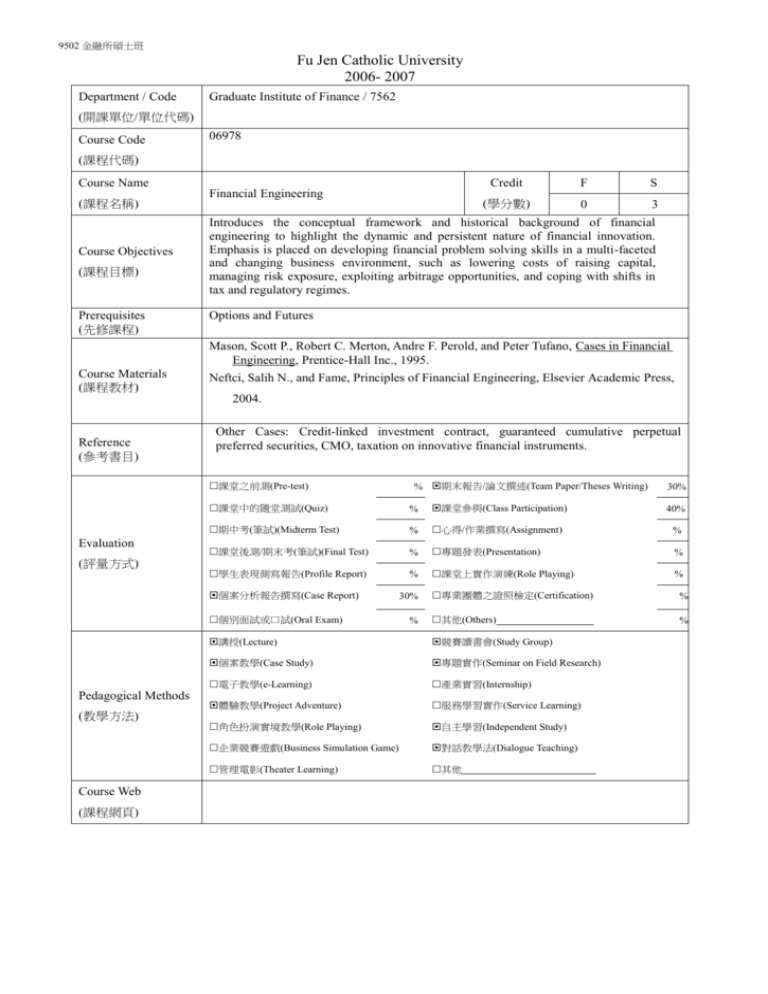
9502 金融所碩士班 Fu Jen Catholic University 2006- 2007 Department / Code Graduate Institute of Finance / 7562 (開課單位/單位代碼) Course Code 06978 (課程代碼) Course Name (課程名稱) Course Objectives (課程目標) Prerequisites (先修課程) Course Materials (課程教材) Financial Engineering Credit F S (學分數) 0 3 Introduces the conceptual framework and historical background of financial engineering to highlight the dynamic and persistent nature of financial innovation. Emphasis is placed on developing financial problem solving skills in a multi-faceted and changing business environment, such as lowering costs of raising capital, managing risk exposure, exploiting arbitrage opportunities, and coping with shifts in tax and regulatory regimes. Options and Futures Mason, Scott P., Robert C. Merton, Andre F. Perold, and Peter Tufano, Cases in Financial Engineering, Prentice-Hall Inc., 1995. Neftci, Salih N., and Fame, Principles of Financial Engineering, Elsevier Academic Press, 2004. Reference (參考書目) Other Cases: Credit-linked investment contract, guaranteed cumulative perpetual preferred securities, CMO, taxation on innovative financial instruments. 課堂之前測(Pre-test) Evaluation (評量方式) % 課堂參與(Class Participation) 40% 期中考(筆試)(Midterm Test) % 心得/作業撰寫(Assignment) % 課堂後測/期末考(筆試)(Final Test) % 專題發表(Presentation) % 學生表現側寫報告(Profile Report) % 課堂上實作演練(Role Playing) % 個別面試或口試(Oral Exam) (教學方法) Course Web (課程網頁) 30% 課堂中的隨堂測試(Quiz) 個案分析報告撰寫(Case Report) Pedagogical Methods % 期末報告/論文撰述(Team Paper/Theses Writing) 30% % 專業團體之證照檢定(Certification) % 其他(Others) % 講授(Lecture) 競賽讀書會(Study Group) 個案教學(Case Study) 專題實作(Seminar on Field Research) 電子教學(e-Learning) 產業實習(Internship) 體驗教學(Project Adventure) 服務學習實作(Service Learning) 角色扮演實境教學(Role Playing) 自主學習(Independent Study) 企業競賽遊戲(Business Simulation Game) 對話教學法(Dialogue Teaching) 管理電影(Theater Learning) 其他 Week Date Topic 1 2/28 Holiday 2 3/7 Introduction 3 3/14 Financial innovation and the financial system 4 3/21 Securities innovations: A historical and functional perspective 5 3/28 Arbitrage: U.S. Government Debt Market, Cougars, Arbitrage in the Government Bond Market, Coca-Cola Harmless Warrants 6 4/4 Extended holiday 7 4/11 Taxes, regulation and accounting stimuli (debt): Citicorp, Schroders’ perpetual floating-rate note exchange offer, Metromedia Broadcasting Corporation. 8 4/18 Securitization: Travelers mortgage securities CMO, American Express TRS charge-card receivables, Lehman Brothers’ securitization pricing and distribution. Course Outline (課程大綱進度) 期中考週 9 4/25 Midterm 10 5/2 Information asymmetry: Contingent claims analysis, Arley Merchandise Corporation, Avon Products, Inc., Alza and Bio-Electro Systems. 11 5/9 Taxes, regulation and accounting stimuli (equity): ARPPS, MMP, Waste Management, Inc. 12 5/16 Managing issuers’ exposures: Interest rate derivatives, Currency swaps, B.F. Goodrich-Rabobank interest rate swap, Walt Disney’s yen financing, Liability Management at General Motors. 13 5/23 14 5/30 Managing investors’ exposures: An investment linked to commodity futures, Shearson Lehman Hutton’s covered warrant business, Nikkei put warrants, LOB portfolio insurance & SuperTrust 15 6/6 16 6/13 Final 期末考週 17 18 Contribution to 全人教育 做中學 Mission (Holistic Education) (Learning by doing) (本課程與管理學院 人本價值 整合資源 創新知識 國際視野 使命之關係) (Human-centric values) (Resource integration) (Innovative knowledge) (International view) 掌握投入之專業知識內涵並能建立起一套學習及研究的方法。 Each student should be able to recognize the appropriate methods and procedures of research pertaining to their area of specialization. This learning goal is met through the completion of their thesis projects. Contribution to learning goals: management college (本課程能達成開課 單位的哪些目標-院) 能整合理論與實務,提升各種組織之績效。 Each student should be able to integrate theory and practical applications to increase the productivity of organizations. This learning goal is met through the course embedded exams. 拓展國際視野與觀點,提升其國際化能力。 Each student should be able to expand their global perspectives to adapt to internationalization. This learning goal is met through the course embedded exams. 善用現代資訊科技於資源之統整與應用。 Each student should be able to capitalize on modern information technology in the integration and use of resources. This learning goal is met through the course embedded exams. 建立正確的專業倫理與人本價值觀念並應用於專業的決策中。 Each student should be able to recognize professional ethics and human-centric values, and be able to apply them in professional decision-making. This learning goal is met through the course embedded exams. 促進同學間之知識分享與經驗交流,加速彼此成長。 Contribution to learning goals: Graduate Institute of Finance (本課程能達成開課 單位的哪些目標-所) Instructor (老師資料) Each student should be able to share knowledge and experience with other students to foster mutual growth. This learning goal is met through projects. 培養學生之國際視野與外語能力。 Each student should be able to possess an international perspective and foreign language proficiency. This learning goal is met through the course embedded exams. 培養職場第二專長,使其具生涯轉換能力(財務金融領域之第二專長)。 Each student should have supplementary skills to afford them the ability to change careers (second skill in the field of finance). This learning goal is met through the course embedded exams. 了解實務運作之學理基礎,並善用於實務現場。 Each student should be able to understand and properly apply theories in practice. This learning goal is met through the course embedded exams. David M. Chen 陳明道 E-mail: acct1004@mails.fju.edu.tw Phone: 29052783 Office Hour: Monday 2-4 & Thursday 2-4 Room: SL422
